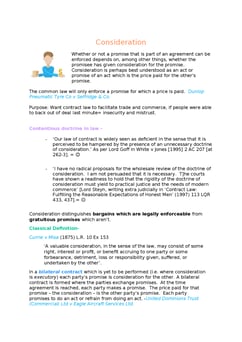Eastwood v Kenyon [1840] 11 Ad & E 438, 113 ER 482
Judgement for the case Eastwood v Kenyon
Table Of Contents
KEY POINTS
Contract Consideration is something of value exchanged between parties in a contract, a key element for a contract's validity. In contracts, it refers to a willingly given financial advantage or gain.
Acceptance by the defendant is crucial for contract formation, indicating their willingness to be bound by its terms. In a contract, it means agreeing to repay someone for expenses or losses incurred. Contracts often need to be in writing to be enforceable in certain situations.
Promise for Another's Debt involves agreeing to pay someone else's debt, a significant contract consideration.
Promise to Pay Debt to Third Person is a commitment to settle a debt owed to someone else in a contract. The statute dealing with contracts and writing requirements is the "Statute of Frauds." The statute is called the "Statute of Frauds" and dates back to 1677. These contract considerations are addressed in Section 4 of the Statute of Frauds, 1677.
FACTS
The testator appointed the plaintiff executor, who died without a will for his real estate.
The testator's sole heir, his infant child "S," had the realty. During S's minority, the plaintiff spent £140 to enhance the realty.
To recover costs, the plaintiff borrowed the same amount from "B," securing it with a promissory note.
When S came of age, she pledged to repay the note and covered a year's interest.
After marrying the defendant, he acknowledged and agreed to repay the note upon reviewing the plaintiff's accounts. However, the defendant didn't fulfill the promise, leading to a claim by the plaintiff.
The defendant argued that his promise fell under the Statute of Frauds' section 4 regarding promises to pay another's debt, requiring a written form for enforceability – lacking in this case.
JUDGEMENT
Section 4 of the Statute of Frauds, which pertains to promises to pay another's debt, applies solely to promises directed to the creditor of the debt. In this case, the defendant's promise was made to the plaintiff, not to the creditor "B." Hence, it does not fall within the scope of the statute.
While the plaintiff voluntarily provided a financial benefit, which the defendant accepted without solicitation, this alone does not constitute adequate consideration for the defendant's subsequent explicit promise to reimburse the plaintiff.
COMMENTARY
The plaintiff was appointed executor, and the testator died without a will for his real estate. The testator's child, "S," inherited the property. During "S's" minority, the plaintiff spent £140 to improve the real estate. The plaintiff borrowed the same amount from "B," secured by a promissory note to recover the costs. "S" agreed to repay the note upon adulthood and covered one year's interest. After marrying, the defendant acknowledged the debt and promised repayment after reviewing records. However, he didn't fulfill this promise, leading to a lawsuit.
The defendant argued that Section 4 of the Statute of Frauds applied, requiring written enforceability for promises to pay another's debt – not met here.
-
The court ruled:
Section 4 applies to promises to the creditor, not fulfilled here as the defendant promised the plaintiff, not the creditor "B".
A financial benefit accepted by the defendant without request isn't adequate consideration for his subsequent promise to reimburse the plaintiff.
ORIGINAL ANALYSIS
Plaintiff was the guardian of X and had borrowed money to educate her etc. X’s husband, Defendant, undertook to repay Plaintiff what he had borrowed to bring up X (previously it had been X herself repaying Plaintiff). He failed to do so.
The court ruled that conferring a benefit on someone voluntarily, which they did not ask for, is not enough to found a contract even when supported by subsequent promise.
Lord Denman
Even if the expense had been at the request of X, there still would be no contract since “past consideration is no consideration at all”.
This rule “must be made absolute” and that past consideration creates only moral, NOT contractual, obligation.
For Further Study on Eastwood v Kenyon

A collection of the best GDL notes the director of Oxbridge Notes (an O...

Contract law notes fully updated for recent exams at Oxford and Cambrid...
Need instant answers? Our AI exam tutor is here to help.
Ask questions 🙋 Get answers 📔 It's simple 👁️👄👁️
Our AI is educated by the highest scoring students across all subjects and schools. Join hundreds of your peers today.
Get StartedSimilar Cases
Related Product Samples
These product samples contain the same concepts we cover in this case.

 Since 2010, Oxbridge Notes has been a trusted education marketplace, supplying high-quality materials from top achievers at universities like Oxford, Cambridge, LSE, Harvard, and Yale.
Since 2010, Oxbridge Notes has been a trusted education marketplace, supplying high-quality materials from top achievers at universities like Oxford, Cambridge, LSE, Harvard, and Yale.